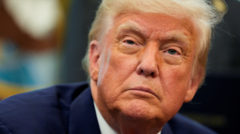Following a US-brokered ceasefire, India and Pakistan remain on high alert as accusations of violations emerge. Leaders from both countries express commitment to the peace process, amidst the backdrop of ongoing military tensions related to the Kashmir conflict.
Tensions Persist Despite India-Pakistan Ceasefire Agreement

Tensions Persist Despite India-Pakistan Ceasefire Agreement
A ceasefire reached between India and Pakistan shows signs of enduring challenges, as both nations accuse each other of violations shortly after the agreement.
A fragile ceasefire between India and Pakistan appears to be holding as of early Sunday, despite accusations of violations from each side just hours after the agreement was established. This agreement, brokered primarily by the United States, comes after a series of intense military exchanges which marked the worst confrontation between the two nations in recent decades.
The ceasefire was announced by US President Donald Trump, who lauded the commitment from both Indian and Pakistani leaders, stating that without it, millions could have faced dire consequences. His remarks follow reports of explosions detected in Indian-administered Kashmir soon after the ceasefire announcement, with both nations exchanging blame for the incidents.
The tensions escalated following India's retaliatory strikes targeting locations in Pakistan and Pakistan-administered Kashmir in response to a devastating militant assault on tourists in Pahalgam that resulted in 26 deaths. India maintains that these strikes were essential to holding accountable those responsible for the attack, while Pakistan has categorically denied involvement in the militant operations.
Indian Foreign Secretary Harsh Vardhan Shringla accused Pakistan of multiple breaches of the ceasefire, warning of a robust response if necessary. Conversely, a spokesperson from Pakistan's Ministry of Foreign Affairs declared the nation’s adherence to the agreement, despite what they describe as Indian violations. They urged restraint from ground troops in the region.
Both India and Pakistan hold claims to Kashmir, which has been a historical flashpoint since their partition during the British Empire's dissolution in 1947, leading to two wars over the territory.
Indian External Affairs Minister S. Jaishankar confirmed the ceasefire reached on the grounds of a mutual understanding to halt military actions. He reiterated India's ongoing stance against terrorism. On the other hand, Pakistan's Prime Minister Shehbaz Sharif emphasized that the ceasefire serves the interests of the region’s populace.
In response to the diplomatic efforts leading to the ceasefire, US Secretary of State Marco Rubio stated that discussions toward broader issues between both countries would commence at a neutral venue. Trump, in subsequent statements, commended the leaders of both nations for recognizing the necessity to cease current hostilities.
UN Secretary General Antonio Guterres welcomed the agreement, while UK Prime Minister Sir Keir Starmer expressed satisfaction with the current ceasefire, emphasizing the importance of maintaining lasting peace in the region.
As of now, fighting has reportedly intensified with both countries alleging targeted actions against their respective military installations. Although the ceasefire represents a hopeful step toward peace, the underlying tensions in Kashmir continue to pose substantial challenges.






















